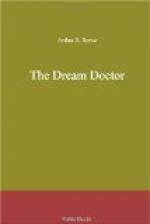The idea was startling in the extreme. Here was Kennedy, as it were, overturning what had been considered the last word in science as it had been laid down by the experts for the prosecution, opinions so impregnable that courts and juries had not hesitated to condemn a man to death.
“There have been cases,” Craig went on solemnly, “and I believe this to be one, where death has been pronounced to have been caused by wilful administration of a vegetable alkaloid, which toxicologists would now put down as ptomaine-poisoning cases. Innocent people have possibly already suffered and may in the future. But medical experts—” he laid especial stress on the word—“are much more alive to the danger of mistake than formerly. This was a case where the danger was not considered, either through carelessness, ignorance, or prejudice.
“Indeed, ptomaines are present probably to a greater or less extent in every organ which is submitted to the toxicologist for examination. If he is ignorant of the nature of these substances, he may easily mistake them for vegetable alkaloids. He may report a given poison present when it is not present. It is even yet a new line of inquiry which has only recently been followed, and the information is still comparatively small and inadequate.
“It is very difficult, perhaps impossible, for the chemist to state absolutely that he has detected true conine. Before he can do it, the symptoms and the post-mortem appearance must agree; analysis must be made before, not after, decomposition sets in, and the amount of the poison found must be sufficient to experiment with, not merely to react to a few usual tests.
“What the experts asserted so positively, I would not dare to assert. Was he killed by ordinary ptomaine poisoning, and had conine, or rather its double, developed first in his food along with other ptomaines that were not inert? Or did the cadaveric conine develop only in the body after death? Chemistry alone can not decide the question so glibly as the experts did. Further proof must be sought Other sciences must come to our aid.”
I was sitting next to Mrs. Godwin. As Kennedy’s words rang out, her hand, trembling with emotion, pressed my arm. I turned quickly to see if she needed assistance. Her face was radiant. All the fees for big cases in the world could never have compensated Kennedy for the mute, unrestrained gratitude which the little woman shot at him.
Kennedy saw it, and in the quick shifting of his eyes to my face, I read that he relied on me to take care of Mrs. Godwin while he plunged again into the clearing up of the mystery.
“I have here the will—the second one,” he snapped out, turning and facing the others in the room.
Craig turned a switch in an apparatus which his students had brought from New York. From a tube on the table came a peculiar bluish light.
“This,” he explained, “is a source of ultraviolet rays. They are not the bluish light which you see, but rays contained in it which you can not see.




